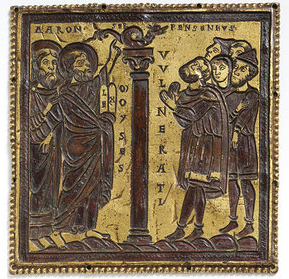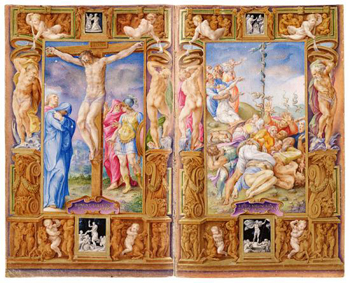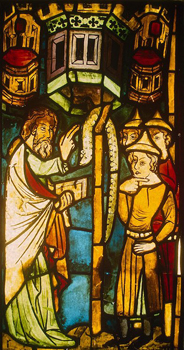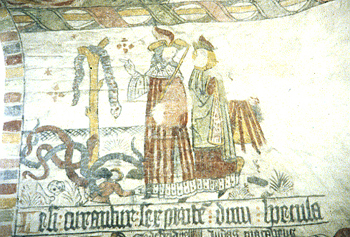From Our Archive
Debie Thomas, Looking Up (2021); and In a Nutshell (2018); and Dan Clendenin, Confession is Good for the Soul (2012).
This Week's Essay
Ephesians 2:8-9: "For by grace you have been saved through faith, not of works."
For Sunday March 10, 2024
Fourth Sunday in Lent
Lectionary Readings (Revised Common Lectionary, Year B)
Numbers 21:4-9
Psalm 107:1-3, 17-22
Ephesians 2:1-10
John 3:14-21
I was born and raised in the Presbyterian church, but nonetheless came late to the observance of Lent. In recent years, my Lenten practices have included pretty standard fare. One year I read through the four gospels. Another year I read the book by Stanley Hauerwas called Cross-Shattered Christ; Meditations on the Seven Last Words. I've also given up coffee and alcohol, which taught me that abstinence is easier than self-control, and that my appetitive desires have a power all their own.
Another Lent I ate just one meal a day in an effort to identify with the 800 million people around the world who experience chronic hunger. That was hard. By late afternoon I felt cold, even if I put on a sweater. I became agitated and distracted, unable to concentrate on anything. My fast also led to legalistic hair-splitting — wasn't an afternoon snack cheating, or just an early dinner? And didn't gorging myself at supper defeat the purpose of fasting in the first place?
 |
|
Moses and the Brazen Serpent, Belgium, c. 1160 (copper alloy, gold, enamel engraving).
|
I think these disciplines were good for me, even though I struggled with my motives. Lenten practices of self-denial are a positive pushback in our culture of self-indulgence.
Lenten disciplines also appeal to my ascetic streak. My wife jokes that I'm an "all or nothing" sort of person who won't take an afternoon hike with her but will do a 500-mile pilgrimage. I remember right where I was sitting at the dinner table thirty years ago when a friend joked, "Dan, were you born serious?"
On the other hand, the early desert monastics warned of all forms of extremist zeal. They knew from personal experience that there's a thin line between self-discipline and self-justification. In our culture of merit, Lenten disciplines can become a way to prove yourself, spiritually-speaking — to others, to yourself, and certainly to God.
But trying to earn God's love is a fool's errand. It's both unnecessary and impossible.
 |
|
The crucifixion, Moses and the brazen serpent, illuminated mss. by Giulio Clovio, 1546.
|
So, one year for Lent I did something different. I did nothing at all. I tried to follow Edwina Gateley's wisdom (see below) to be quiet and still before God. To say nothing. Ask nothing. And do nothing. Nothing, that is, except to "let your God / Look upon you with his enormous love. / That is all."
And that's a different kind of hard.
I got support for my Lent-Lite from my wife. She likes to joke that "Lent isn't in the Bible." She's on the right side of Scripture, but the wrong side of history — since the fourth century, many Christians have observed the 40 week days before Easter as a season of reflection, repentance, fasting, and acts of mercy. Nonetheless, she makes a very Protestant point.
The Protestant Reformation denounced all manner of "romish popery." John Calvin dismissed Lent as a "superstitious observance." Huldrich Zwingli defended a Zurich printer named Christoph Froschauer, who had defied the church's prohibition against eating meat during Lent by inviting twelve friends for a sausage dinner. Froschauer was arrested, but later released, after Zwingli preached a sermon called On Rejecting Lent and Protecting Christian Liberty from Man-Made Obligations. So, even today, various Protestants do not observe Lent — Anabaptists, Quakers, some Baptists, various Reformed traditions, and all sorts of non-denominational believers.
 |
|
Moses and the serpent, German
stained glass, late 14th century. |
I also have a friend who described to me how his spiritual director counseled him to "abstain" from all his tried-n-true ways of seeking God — conversational prayer, meditation, the rosary, Christian books, lectio divina, and the like. He's "fasting" from all that hard work that he usually does to relate to God. Similarly, in a recent article in the NYT (February 17, 2024), Chanequa Walker-Barnes described giving up "self-neglect" for Lent. Instead, she focused on "40 Days of Self-Care," which practice led to her recent book Sacred Self-Care (2023).
Our Jewish friends have an ancient ritual to address our spiritualities of Trying Too Hard. It's called Kol Nidre — in Aramaic, "all vows." The Kol Nidre is a declaration that is recited at the beginning of the service on the eve of Yom Kippur (Day of Atonement).
The cantor chants a prayer that begins with the first two words Kol Nidre:
"All vows, obligations, oaths, and anathemas, whether called 'ḳonam,' 'ḳonas,' or by any other name, which we may vow, or swear, or pledge, or whereby we may be bound, from this Day of Atonement until the next (whose happy coming we await), we do repent. May they be deemed absolved, forgiven, annulled, and void, and made of no effect; they shall not bind us nor have power over us. The vows shall not be reckoned vows; the obligations shall not be obligatory; nor the oaths be oaths."
The counterintuitive idea of Kol Nidre is that, however well-intended, we break our promises to God. So, I "repent" of all my vows and promises to God, and receive forgiveness for and freedom from them.
In John's gospel this week, Jesus describes our struggle between light and dark, life and death, salvation and condemnation, belief and unbelief. No one is immune from this struggle. Nobody gets a free pass. "All of us," says Paul in the reading from Ephesians, are implicated. And the struggle comes to us, he says, "by nature." Indeed, "the basic and most fundamental problem of the spiritual life," said Thomas Merton, "is this acceptance of our hidden and dark self."
So, what am I to do? Double down on Lenten religious effort?
 |
|
Moses and the brazen serpent, Danish wall painting, c. 1520.
|
John 3 for this week repurposes a story from Numbers 21 to point the way forward. Just as Moses lifted up a bronze serpent in the desert that healed people merely by looking at it, so today we only have to look to the love of God in Jesus. There's nothing else we can or should do.
In his little epistle, John strips away all pious pretense with a shocking admission: "In this is love, not that we loved God, but that he loved us." The only thing I'm asked to do is "to know and rely upon the love that God has for us” (1 John 4:10, 16).
Paul says the same thing this week in Ephesians. I experience God's favor "by grace through faith," apart from any human merit. His goodness is a free gift, not a reward for my spiritual efforts. And my faith? Luther compared faith to "the beggar's empty hand" that receives a gift. God only asks me to accept his acceptance, in the words of the hymn, "just as I am, / without one plea."
This Lent I want to experience what Denise Levertov describes in her poem The Avowal.
As swimmers dare
to lie face to the sky
and water bears them,
as hawks rest upon air
and air sustains them,
so would I learn to attain
free fall, and float
into Creator Spirit’s deep embrace,
knowing no effort earns
that all-surrounding grace.
A true saint, said Merton, is not someone who has become good through strenuous disciplines, however well-intended, but someone who has experienced the free goodness of God.
NOTE: On Edwina Gateley's poem, see her book There Was No Path So I Trod One (2013).
Weekly Prayer
Mary Elizabeth Coleridge (1861–1907)
Sunshine let it be or frost,
Storm or calm, as Thou shalt choose;
Though Thine every gift were lost,
Thee Thyself we could not lose.
Dan Clendenin: dan@journeywithjesus.net
Image credits: (1) Victoria and Albert Museum (London); (2) The Morgan Library and Museum (New York, NY); (3) State Hermitage Museum (St. Petersburg, Russia); and (4) The-Orb.net.





